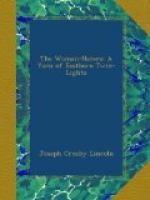“Huh! Well, ‘twill be hard supposin’, but I’ll try. Heave ahead.”
“Suppose that you’d never been used to working or supporting yourself. Had a position, a nominal one, in your dad’s office but absolutely no responsibility, all the money you wanted, and so on. Suppose because your father wanted you to—and her people felt the same—you had become engaged to a girl, a nice enough girl, too, in her way. But, then suppose that little by little you came to realize that her way wasn’t yours. You and she liked each other well enough, but the whole thing was a family arrangement, a money arrangement, a perfectly respectable, buy-and-sell affair. That and nothing else. And the more you thought about it, the surer you felt that it was so. But when you told your governor he got on his ear and sailed into you, and you sailed back, until finally he swore that you should either marry that girl or he’d throw you out of his house and office to root for yourself. What would you do?”
“Hey? Land sakes! I don’t know. I always had to root, so I ain’t a competent judge. Go on, you’ve got me interested.”
“Well, I said I’d root, that’s all. But I didn’t have the nerve to go and tell the girl. The engagement had been announced, and all that, and I knew what a mess it would make for her. I sat in my room, among the things I was packing in my grip to take with me, and thought and thought. If I went to her there would be a scene. If I said I had been disinherited she would want to know why—naturally. I had quarreled with the governor—yes, but why? Then I should have to tell her the real reason: I didn’t want to marry her or anybody else on such a bargain-counter basis. That seemed such a rotten thing to say, and she might ask why it had taken me such a long time to find it out. No, I just couldn’t tell her that. So, after my think was over, I wrote her a note saying that my father and I had had a disagreement and he had chucked me out, or words to that effect. Naturally, under the circumstances, marriage was out of the question, and I released her from the engagement. Good by and good luck—or something similar. I mailed the letter and left the town the next morning.”
He paused. The lightkeeper made no comment. After a moment the young man continued.
“I landed in Boston,” he said, “full of conceit and high-minded ideas of working my own way up the ladder. But in order to work up, you’ve got to get at least a hand-hold on the bottom rung. I couldn’t get it. Nobody wanted a genteel loafer, which was me. My money gave out. I bought a steamboat passage to another city, but I didn’t have enough left to buy a square meal. Then, by bull luck, I fell overboard and landed here. And here I found the solution. I’m dead. If the governor gets soft-hearted and gets private detectives on my trail, they’ll find I disappeared from that steamer, that’s all. Drowned, of course. She’ll think so, too. ‘Good riddance to bad rubbish’ is the general verdict. I can stay here a year or so, and then, being dead and forgotten, can go back to civilization and hustle for myself. But a woman is at the bottom of my trouble, and I never want to see another. So, if my staying here depends upon my seeing them, I guess, as I’ve said twice already, ’you’ll have to hire another boy.’”




